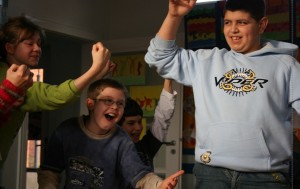
Contact
Prof. Dr. Benedikt Sturzenhecker
E-Mail: benedikt.sturzenhecker (at) uni-hamburg (dot) de
Participation in child and youth work
Participation is an essential part of child and youth work. In Germany, the Child and Youth Services Act (Code of Social Law VIII §11) requires by law that child and youth work offer services reflecting the interests and concerns of children and young people involved and at the same time afford the children and young people the opportunity to actively take part in deciding on and shaping the various services offered to them. Apart from in the field of child and youth work, there is hardly any other institution within the scope of child and youth education in which structural conditions challenge and encourage children and young people more to participate in democratic processes when defining and planning mutual activities. In doing so, child and youth work offers at a structural level young people a unique space in which they can experience genuine democratic decision-making processes, joint action and mutual responsibility. Democracy within child and youth work is something learned by means of participatory democratic practice. We call this democratic education (Demokratiebildung). However, child and youth work professionals as well as agencies and institutions need to use and enlarge the structural potentials of democracy.
Even though there are more opportunities for democratic education in open child and youth work and youth associations than in any other field of child and youth education, there is still nonetheless a great need to increase the scope of democratic participation among girls and boys in decision-making processes. The right to participation granted to children and young people by German law has to become something more tangible to its holders within everyday youth work settings. More democratic participation also has positive side effects: studies show that increasing participation among young people makes child and youth work more appealing and that participatory democratic practice has a beneficial effect on children and young peoples‘ educational outcomes.
The Institute for Participation and Education can provide support in the following areas:
- Establishment of a structural basis for and/or expansion of preexisting child participation practice within open child and youth work and youth associations
- Development of appropriate professional practice concepts for individual organizations and associations
- Professional and volunteer staff training in participatory democratic practice
- Design, analysis and evaluation of pilot projects on participation
